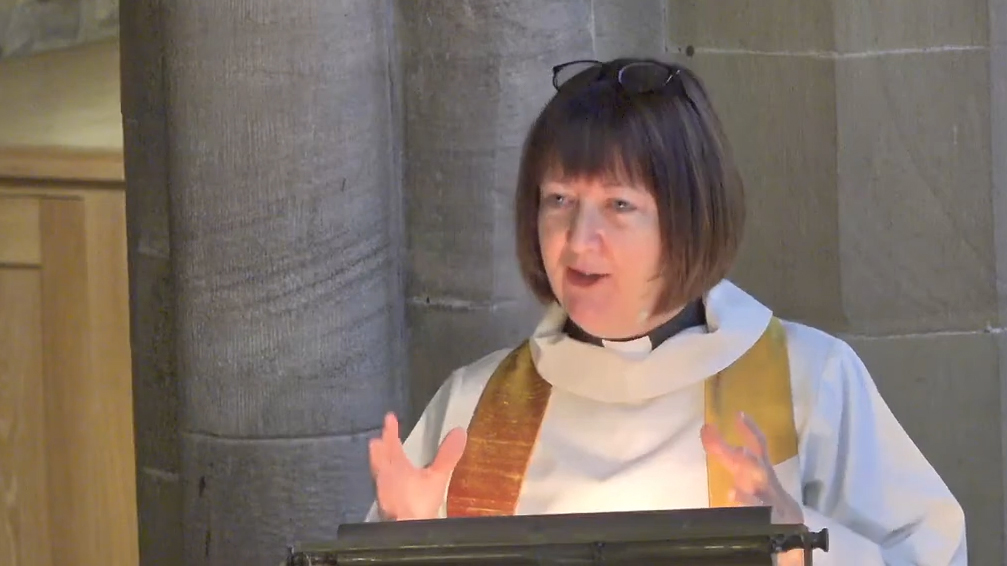Preached by the Revd Dr Jo Logan, Reflective Practice Tutor, St Hild College
About 15 years ago, I saw an advert that Ken Dodd was coming to Scarborough. I don’t know if any of you ever saw Ken Dodd on stage? I had previously seen him back when I was a child with my grandparents parents on holiday and we had really enjoyed it. So, when I saw he was in Scarborough, I decided to get tickets for my husband and me. The performance started at 7.30pm. At about 9pm I was getting a bit thirsty and wondering when the interval might be. By 10pm it was clear that there would be no interval. At 10.30pm, there was a finale, the lights came up, and it was the end of the show. Or so we thought. It was then that a voice came over the speaker system: ‘the performance will start again in 20 minutes.’ We thought it was all over, but we were only at half-time.
In one way I think that Epiphany is a bit like that experience at the Ken Dodd show. We’ve celebrated Christmas Day, the cards and the presents are long since opened, we’ve taken down the tinsel and the fairy lights and then, on 8 January we come to church and what happens?…..in walk the three wise men. Just when you thought Christmas was all over, you find you’re at half time.
But this gives us an opportunity: an opportunity to look again at these three men who arrive from the East to see Jesus. So often they appear on our Christmas cards and in our nativity plays along with the shepherds and the angels and all of those gathered at Bethlehem. But Epiphany gives us a chance to separate them out from that rather crowded stable and tell their own particular story, just as Matthew does in our gospel reading this morning.
At the heart of our gospel reading from Matthew chapter 2 is a contrast between the three wise men and King Herod. The wise men enter Jerusalem making no secret of the purpose of their journey – they have come to pay homage to Jesus. They are open with Herod himself, giving him the details of how they know about Jesus, even the exact time the star appeared. When they finally arrive at Bethlehem, they are overwhelmed with joy and they kneel before this small child, giving him what they have travelled so far to bring – their gifts and their worship. With the wise men, there is joy, openness and truth. Contrast all of that with Herod. For Herod, there is no joy on hearing about Jesus, instead, his first reaction (in verse 3) is fear. Then he secretly summons the wise men to meet with him (in verse 7) before lying to them in verse 8 when he tells them that he too wants to worship Jesus. With Herod there is fear, secrecy and deception.
So what lies behind these two contrasting responses of the wise men and Herod? I think it’s to do with power. When he hears about Jesus, Herod is frightened of losing power. It’s clear that Herod knows exactly who Jesus is – he knows he is the promised Messiah. Herod fears Jesus because he sees him as a threat to his own position. And he decides that the threat needs to be neutralised.
It is a story that keeps repeating. We don’t have to look far today to see leaders, often aging, who seem to dread losing power. They respond by claiming that elections they lost were rigged, or by imprisoning their opposition, or worse. They respond, like Herod, by trying to neutralise the threat.
But the three wise men, on the other hand, accept and acknowledge where true power lies. Right from the start, their purpose is to pay homage to Jesus. By kneeling before him and by offering their gifts to him, they acknowledge that above and beyond all worldly kingdoms, empires, states, federations and republics, there is the ultimate power of God – made manifest in a child born in poverty in a village.
So what does this mean for us? Acknowledging God can be difficult. Christian faith can seem out-dated. According to recent censuses, people in England and Wales identifying as Christian went down from 72% in 2001, to 59% in 2011, and then to 46% in 2021. When we say we are Christians in England, we seem to identify ourselves as sitting on a sinking ship, clinging on to ideas of the past.
But, God’s power is not simply a past event. We can see it at work today in the lives of those who are open to trusting God. I don’t know if any of you are football fans? Or if you watched the men’s world cup just before Christmas? I was struck by the number of footballers in the England team who are open and clear about their Christian faith. I’m thinking of Raheem Sterling, Marcus Rashford and Bukayo Saka in particular. Bukayo Saka’s Instagram handle is God’s Child – here is a multi-million pound footballer who defines himself by his relationship with God. Saka and Sterling and Rashford acknowledge that above and beyond the world of international football today, there is God.
So far, I’ve concentrated on responding to God. The contrasting responses of Herod and the wise men, and what they might mean for us. But there’s another crucial aspect of our passage this morning. That God takes the initiative. It is God who has sent the star which prompts the wise men to travel. It is God who has inspired the prophecy which identifies where Jesus will be born. And it is God who provides the dream which, at the end of our passage, leads the wise men to safety.
We believe in a God who takes the initiative. A God who sends the signs that there is a bigger power at work beyond the structures of earthly rule and human capacity to imagine. God takes the initiative and comes forward to meet us, often in places we might least expect, just as God met the wise men in a child born in poverty in a village.
I’d like to finish with two Christmas stories. I think I’m allowed to do that even after 12th night, because today is all about the wise men.
A few years ago, the BBC screened a drama called The Nativity – you may remember it. It was written by Tony Jordan, the script writer of EastEnders. Tony Jordan, by his own account, went to consult theologians and historians as background for his script….some of whom assured him that it didn’t really happen, that there was no such thing as the virgin birth. But as he went to work on his script, he said this: ‘As I wrote – spending those long evenings two o’clock, three o’clock in the morning, I suddenly realised that it’s true. It was nothing to do with the research. All I can tell you is, you know a truth when you hear it…and I know [rubbish] when I hear it, and I came out of that whole process crying and thinking it was true.’ In the midst of writing another script, and when he might least have expected it, God met Tony Jordan.
The second story is also about a BBC programme, or more specifically, the book behind the programme. Do any of you watch Call the Midwife? For those of you who haven’t seen it, it tells the story of a group of nuns who devoted their lives to caring for the health of people in the slums of the East End in the 1950s. The TV production is based on the true story of Jennifer Worth, who lived with that community of nuns and wrote books about her experience. I’d like to read you some words from the first book, just as Jennifer is talking to an elderly nun called Sister Monica Joan:
‘What had impelled Sister Monica Joan to abandon a privileged life for one of hardship? Was it love of people? I asked her. ‘Of course not’, she snapped. ‘How can you love ignorant, brutish people whom you don’t even know? Can anyone love filth and squalor?….One can only love God, and through his grace come to love his people…..Go with God, child, just go with God.’ Her constant phrase, Go with God, puzzled me a great deal. Suddenly it became clear. It was a revelation. It filled me with joy….These three words, Go with God, were for me the beginning of faith. That evening I started to read the Gospels.’
When I read about Jennifer Worth, I’m struck by how similar this is to the story of the wise men. In both, there was revelation. For both the way ahead became clear. And the result in both cases was joy – which filled Jennifer Worth and overwhelmed the three wise men.
So, may the joy of God fill us too this Epiphany. May the God who reaches out to meet his people lead us into 2023. And may we respond with openness and courage. May we each go with God.
Amen.

